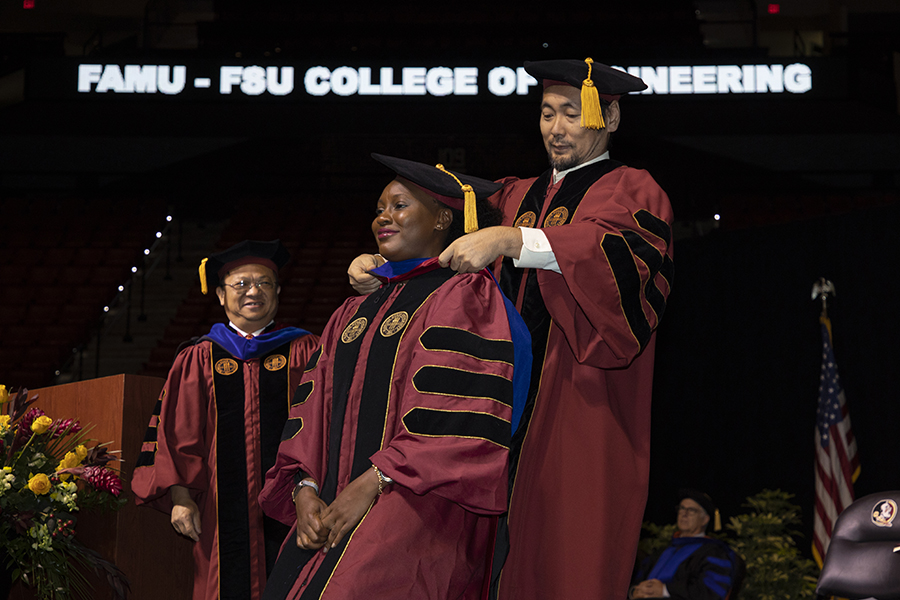
As one of the top public research universities in the nation, doctoral students are integral to Florida State University’s mission.
The new Quality Enhancement Plan (QEP) submitted as part of the university’s reaffirmation of accreditation invests $10 million over five years to enhance doctoral education in alignment with FSU’s 2023–2027 Strategic Plan and establishes a new Graduate Student Resource Center as a “one-stop shop” for graduate student support services.
“Doctoral students are essential to FSU’s success as they work with our top-notch faculty to fuel research discovery for the benefit of our nation and our world,” said Jim Clark, provost and executive vice president for Academic Affairs. “The university is making a significant investment to provide the resources necessary to attract high-quality doctoral students and support them in their scholarly and creative activities.”
Doctoral education has been a key component of the university’s last three strategic plans. Building on this broad-based support for doctoral education and the experiences of doctoral students, Clark convened a committee of multi-disciplinary faculty, doctoral students, and administrators from across campus to work on the newest QEP. The QEP Committee considered initiatives that would improve the experience, performance, and employment prospects of doctoral students.
The committee examined existing support for doctoral education at FSU, literature about key factors in doctoral student success, and promising practices identified by the Council of Graduate Schools and peer institutions across the United States. They also conducted surveys of FSU doctoral students and faculty, held focus groups with university constituencies, and reviewed data on doctoral degree milestones and completions at FSU and other public research institutions.
Following this extensive review, the QEP Committee developed outcomes in five key areas for doctoral student success and learning: boosting doctoral student use of existing university resources and services; improving time from doctoral candidacy to graduation; increasing doctoral student participation and presentations at research conferences and creative events; improving doctoral student job placement skills; and developing doctoral teaching preparation and effectiveness.
“I appreciate the contributions of the doctoral students, faculty, and administrators who served on the QEP Committee, especially Chair Piers Rawling and staff from The Graduate School, Institutional Research, Office of Institutional Performance and Assessment, and the Office of the Provost who supported the work of the QEP Committee,” Clark said.
Florida State will implement several initiatives to improve the experience of the university’s doctoral students.
The new Graduate Student Resource Center (GSRC), headed by Dr. Emily Leventhal, will create a hub for graduate student resources and information, with emphasis on meeting the needs of doctoral students. The center will develop a website with a centralized list of academic and student support services available to all graduate students. The GRSC also will organize an annual resource fair and a workshop series to address professional development topics such as time management, writing skills, project planning and management, stress reduction strategies, professional speaking skills, and other topics identified by doctoral students on the QEP survey.
A research and creative activity (RCA) grant program will be developed and implemented through the GSRC with the goal of increasing scholarly productivity by providing doctoral students the opportunity to attend and present research or creative works at regional, state, national, and international conferences or performance and exhibit venues.
University Libraries will organize several types of graduate skills workshops that feature their resources and expertise. Workshops will include sessions on citation management; literature review; and data management, analysis, and visualization.
The Career Center will provide a set of activities designed to improve readiness for employment, including virtual mock job interviews and consultations with a Graduate Career Liaison. They will also provide virtual skills modules aimed at helping doctoral students prepare for faculty or non-faculty careers through the digital e-learning platform Beyond the Professoriate. The platform includes workshops that prepare doctoral students for first-round interviews and equip them with strategies for securing the job offer.
The Center for the Advancement of Teaching (CAT) will provide ongoing teaching development and support by expanding training for Teaching Assistants (TAs). CAT will offer workshops, reading groups, and other activities designed to help TAs build knowledge of evidence-informed approaches to teaching. In addition to preparing graduate students as future faculty members, this development of learning-centered teaching practices will immediately benefit FSU’s undergraduates enrolled in courses taught by graduate students.
“With the bold vision outlined in the university’s QEP, “Enhancing Doctoral Education,” the next five years will no doubt see unprecedented advancements in the quality of doctoral education at FSU,” Clark said.
For more information about the QEP, visit sacs.fsu.edu/qep.




